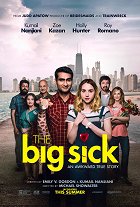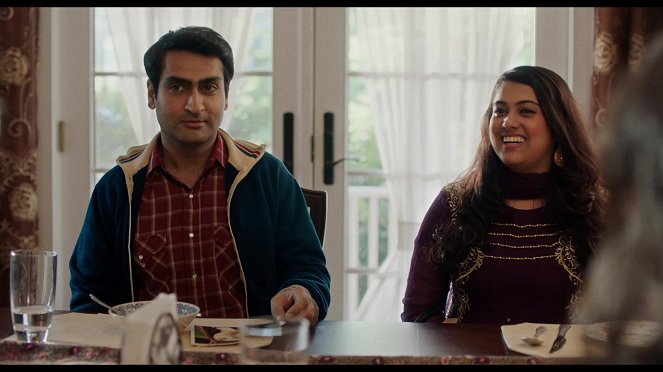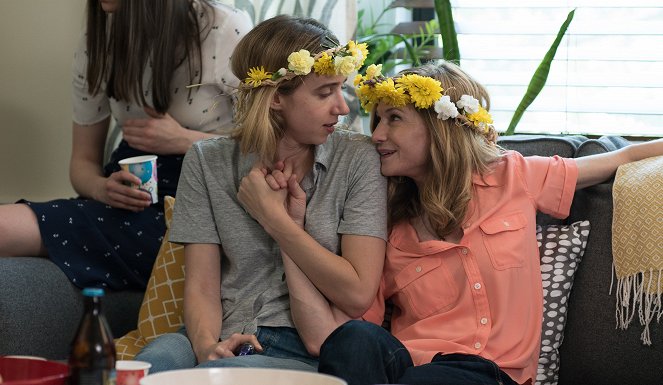Réalisation:
Michael ShowalterPhotographie:
Brian BurgoyneMusique:
Michael AndrewsActeurs·trices:
Kumail Nanjiani, Zoe Kazan, Holly Hunter, Ray Romano, Aidy Bryant, Bo Burnham, Adeel Akhtar, Linda Emond, Anupam Kher, Shenaz Treasury, Isabel Shill (plus)VOD (1)
Résumés(1)
When Emily (Zoe Kazan) contracts a mysterious illness, Kumail (Kumail Nanjiani) must navigate the crisis with her parents and the emotional tug-of-war between his family and his heart. (Roadshow Entertainment)
Vidéo (15)
Critiques (11)
Les critiques enthousiastes du Sundance déclaraient que nous avions là un film qui s'annonçait comme la comédie de l'année, mais le miracle ne se produit pas -The Big Sick est simplement une comédie romantique indépendante standard, comme il en existe par dizaines, voire centaines. Elle est même juste moyennement drôle. Cependant, elle se démarque par son thème pakistanais et sa façon mignonne de se développer, ce qui peut certainement lui être attribué comme un avantage, tout comme les motifs peu communs de la séparation du fils de sa famille pour non-respect des traditions culturelles, les blagues sur les terroristes musulmans et les interprétations métaphoriques possibles sur les conséquences mortelles du mensonge entre deux partenaires.
()
Une autre excellente conversation des appartements avec un sujet mondial d'actualité actuellement brûlant : l'islam. Avec une approche légère et éducative positive et une analyse traditionnelle et précise des relations. Emotionnelle, intelligente, avec un scénario (dialogues) pour une nomination aux Oscars. Je parie aussi sur Zoe Kazan.
()
The Big Sick est un film qui m’a empli de satisfaction. J’ai pris plaisir aux scènes réussies tantôt amusantes, tantôt dramatiques et je ne peux pas me plaindre et dire que c’est une connerie américaine, vu que l’histoire s’est vraiment passée. Les meilleures blagues étaient celle sur les besoins nocturnes et celle sur le 11 septembre.
()
It took me a while to get used to Kumail. For about twenty minutes, I was even pretty uncertain whether this comedy was actually a comedy, or if it was simply an unusual drama. But once Zoe Kazan made an appearance on the scene (or rather in a coma), a whirlwind of great situational humor started that went so natural for Kumail that it really was a pleasure to watch him. For instance, his first encounter with Emily’s parents is really good fun. And there are plenty more similar scenes in the film. Eventually, the unusual drama turns into an unusual dramedy which managed to put me in a really good mood that didn’t disappear even after I finished the movie. The thing is, I read about the film that it was based on a true story and that the main character is the same Kumail as the one in the film. At that point, the movie reached a whole new dimension.
()
Of course, there is nothing wrong with films that cater to the tastes of the masses. The fact they want to be liked (even though they may deal with rather painful issues) and do not arouse any antipathy in viewers only puts critics in a non-conformal position, as they are being manipulated. Therefore, I had a similar problem with The Big Sick as I did with last year’s Sundance hit Captain Fantastic. In a film that boldly combines observational comedy about the clash of different genders and cultures (with humour based on commenting on everyday situations in the manner of stand-up comedy) and melodrama, there is less banality and more truth. The first welcome disruption of the romantic-comedy formula is the unexpectedly early break-up, which is not the worst thing to happen in the central couple’s relationship. After the sudden genre shift, a relationship remains the focal point of the film, but it’s not the relationship between the guy and the girl, but between one of the partners and the other partner’s parents. Considerations as to whether the solution is original or cowardly and rather insensitive toward one of the characters are not very relevant, given the knowledge that this is how it actually happened. Though the film does not completely lose its humour after a change of tone, which may be reminiscent of some of James L. Brooks’s comedy-dramas, it is more serious, more moving and less egocentric than other romantic comedies by young filmmakers. The parents are given almost as much attention as the children, whose self-centredness and unreadiness for life are that much more apparent. The unexpected change of perspective, which Aziz Ansari also works with brilliantly in Master of None, leads us, just like the protagonists, to reassess what is really important in life. Emily and Kumail’s inability or unwillingness to perceive the situation that has arisen from the other’s perspective is more thoroughly elaborated in the slightly repetitive final act of this somewhat drawn-out film (which is, however, a shortcoming of most of the films made or produced by Judd Apatow). The filmmakers like to spend time with their characters and let them carry on dialogue often lasting a few minutes longer than is necessary. Most of the time, however, they adhere to the central theme of "love in spite of” and never deviate from the main storyline for so long that the narrative loses traction and starts to be boring. Besides that, they succeed in utilising most of the plot detours in an emotionally powerful climax, where the alternating perspectives make you care not only about the fortunes of the central couple, but also about the many characters around them. 75%
()



Annonces